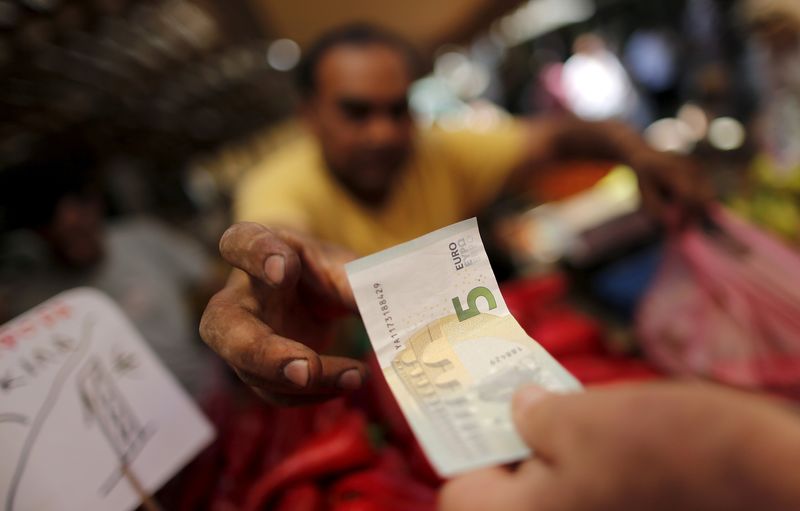By Lefteris Papadimas
ATHENS (Reuters) - A decade ago, Greece was in the throes of a devastating debt crisis marked by years of austerity, hardship and unrest. Now, officials and investors say 2024 could be the year its rebound is finally complete.
The Greek economy is forecast to grow nearly 3% this year, approaching its pre-crisis size of 2009 and far outpacing the euro zone average of 0.8%.
Borrowing costs have plummeted to below those of Italy, and banks bailed out during the crisis are set to be fully privatised for the first time in decades - a move some of the country's largest investors see as a final sign of normality.
"With (the state's participation) out of the way, that's a landmark," said Wim-Hein Pals of asset manager Robeco, which recently bought shares in Greek banks.
"The Greek economy is in good shape to benefit from further growth going forward."
The turnaround in Greece, whose debt crisis threatened to cause the demise of the whole euro zone, is stark - on paper at least. Now the country faces a novel problem: being held back by stagnation in the same euro zone giants that once imposed strict reforms on its economy.
After years shut off from international markets, Greece returned to investment grade credit rating in 2023. When the state's bailout fund last month sold its stake in Piraeus Bank, one of the country's largest, the sale was oversubscribed eight times.
Challenges remain, however. Falling birthrates and labour shortages threaten the long-term outlook, and the spread of climate-related disasters like wildfires and floods have strained government finances.
Many ordinary Greeks reeling from the crisis say they see little difference as economists say the wider benefits of the rebound will take time. To ensure long-term growth, the country needs to diversify beyond the typical economic drivers of tourism, real estate and services.
More than half of foreign direct investment into Greece, which totalled about 7.5 billion euros ($7.98 billion) in 2022, comes from northern European countries like France and Germany that are struggling with weak growth. Greek exports, such as agricultural goods, fuel and pharmaceutical products - two thirds of which head to the EU - fell almost 9% last year. Economic growth slowed to 2% in 2023, partly a result of its lagging neighbours.
"The lower expectations for growth in Europe affect Greece in two main ways. Through pressure on exports... and through the higher cost of money," said Nikos Vettas, head of economic think tank IOBE.
FINANCES REVIVE
Decades of rampant tax evasion and overspending caught up with Greece in 2009, when it went into recession and the government revealed a giant hole in its finances that sent shockwaves across global markets.
By 2015, it had signed three bailouts with the euro zone and the International Monetary Fund worth 280 billion euros. In return it agreed to austerity measures that slashed public sector wages and pensions, and triggered years of violent protests.
Since Greece emerged from the bailout in 2018 it has revived its banking system and has relied solely on debt markets for its borrowing needs. In 2022, it paid off the IMF two years ahead of schedule.
Calm is largely restored. In Athens' central Syntagma Square, where 10 years ago protesters would hurl petrol bombs at riot police in protest at austerity measures, today buskers entertain tourists who sit in the shade of its sour orange trees.
Visits to the Acropolis, Greece's best known ancient site, hit 3.8 million in 2023, nearly four times the number seen at the height of the crisis.
INEQUALITY REMAINS
For many Greeks though, economic recovery has not translated into improved living standards.
Unemployment remains above 10%, the second highest in the EU after Spain, and GDP per capita in purchasing power is among the lowest in the bloc, Eurostat data show. The average monthly salary of 1,175 euros is 20% lower than 15 years ago, according to labour ministry figures.
Greece needs to develop sectors where investments are more long term, said Vettas from IOBE, "like infrastructure projects and manufacturing."
Unions held a general strike on Wednesday in which trains, buses, ships and taxis were halted and hundreds took to the streets calling for higher wages. Some people haven't recovered from losing everything when the economy tanked.
Periklis Fryganas took out a bank loan in 2009 to expand his motorcycle repair shop in Athens, only for the crisis to reduce his turnover by 90% over the next six years. He closed the shop in 2020 and recently lost an apartment he shared with his unemployed wife and three sons after using it as collateral for the loan.
"The crisis broke a lot of people and I was one of them," Fryganas, 61, said. "Things are getting better only for the 'rich ones', all the others are lοsing."
($1 = 0.9404 euros)
